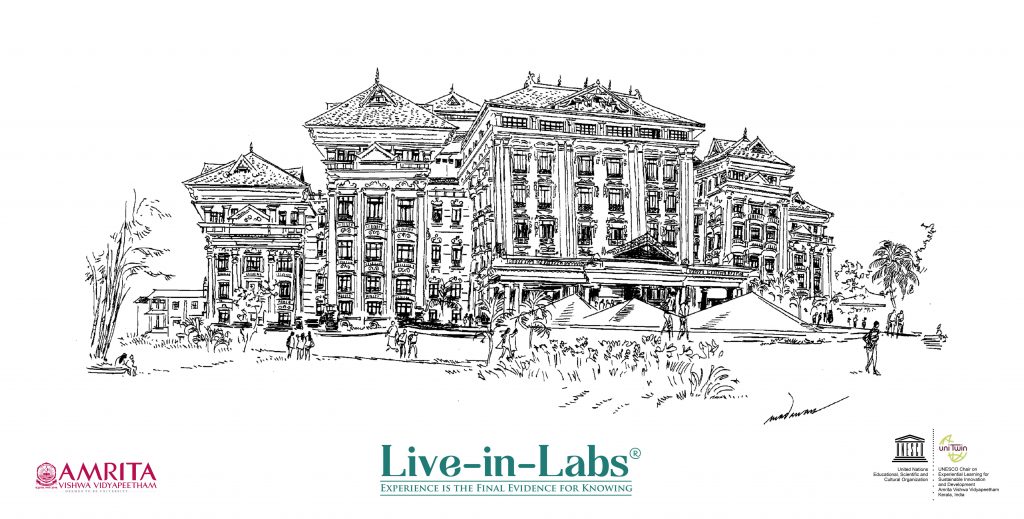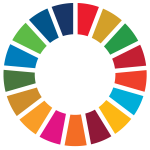Esta web utiliza cookies para que podamos ofrecerte la mejor experiencia de usuario posible. La información de las cookies se almacena en tu navegador y realiza funciones tales como reconocerte cuando vuelves a nuestra web o ayudar a nuestro equipo a comprender qué secciones de la web encuentras más interesantes y útiles.
Live-in-LabsⓇ - A Unique participatory approach for building sustainable Communities
Description
Institution
Amrita VishwaVidyapeetham

Organizations/areas of the university involved
Mata Amritanandamayi Math, School of Engineering, School for Sustainable Development, School of Business, School of Biotechnology, Amrita School of Arts and Sciences, Amrita School of Medicine, School of Social Work, UNESCO Chair for Experiential Learning for Sustainable Innovation & Development, UNESCO Chair on Gender Equality & Women’s Empowerment
Country
India
An interdisciplinary, experiential learning academic program in developing sustainable rural communities for students at Amrita Vishwa Vidhyapeetham and universities worldwide. The Program engages participants in 17 UNSDG’s and 117 SDG targets.
With the Live-in-LabsⓇ academic program, a multi-disciplinary engagement opportunity is provided to the students to solve the multidimensional challenges faced by the rural communities in India. This opportunity helps the students learn through an experiential learning process and impart the UNSDG’s importance. The experiential learning module also includes designing the solution for the identified challenge, which involves the community members in every aspect of the design process – inspiration, ideation, and implementation. The goal of these initiatives is to building self-reliant communities. This curriculum enabled academicians and members of the community to come together to create knowledge societies, followed by empowering remote communities by increasing access to information and knowledge.
The main target groups are faculty, researchers, and students at the undergraduate, graduate, and Ph.D. levels. Worldwide, teams of academic researchers, who are often isolated from the real world, and students have become involved in village development with a top-down approach of problem identification and solutions based on limited experience, limited economic resources, and limited understanding of the culture. There is a need for academia to work with the beneficiaries to develop sustainable interventions for rural communities.
We intend to develop a comprehensive framework for academic engagement in building sustainable communities by designing and integrating a curriculum based on experiential learning that will enable participants to acquire the knowledge, skills, attitudes, and values necessary to shape a sustainable future.
Results and impact measured or expected
Since its inception, the program has been highly successful, as evidenced by 200,000 beneficiaries and the following measured outcomes:
- Training: More than 2000 students have completed the program so far.
- Outreach: Implemented in more than 300 villages
- Sustainability: Interventions related to water (implemented in more than 250 communities with 100,000 beneficiaries), energy (implemented in 2 villages with 600 beneficiaries including rural electrification and microgrids), education (implemented in 41 villages with 30,000 beneficiaries), sanitation, and income generation (lemongrass distillation unit, tailoring unit, craft unit, sanitary napkin manufacturing unit, & automated irrigation systems), health care had wearable diagnostic tools and awareness programs).
- Community: Participants have clocked over 700,000 hours of direct engagement with rural communities.
- Knowledge: Many of these have created sub or spin-off interventions.
- Technology: Technology innovation resulted in more than 50 products developed and over 100 process improvements in the communities.
- International: The program attracted over 700 students from 30 International Universities.
These outcomes led to Amrita being ranked Top 100 in THE Impact Rankings 2021 with the following global rankings in individual SDGs:
- SDG 4 – 5th
- SDG 8 – 8th
- SDG 3 – 37th
- SDG 6 – 52nd

Tags
Connection with the SDG framework
The Live-in-LabsⓇ program utilizes a unique, comprehensive framework for academic engagement, namely Education for LIFE: E4LIFE, implemented at Amrita to develop SDG champions. Through a multi-actor, action-based participatory approach, the Live-in-LabsⓇ program encourages developing and successfully implementing personalized, scalable, and sustainable technical solutions to foster rural development. The program allows participants to study, observe, and interact while living in rural communities to understand challenges in multiple thematic areas better. The thematic areas are Agriculture & Risk Management, Education & Gender Equality, Energy & Environment, Livelihood & Skill Development, Water & Sanitation, Health & Hygiene, and Waste Management & Infrastructure. Through the various initiatives, the SDG goals that have been met include SDG 4, SDG 9, SDG 11, SDG 17, SDG 1, SDG 2, SDG 3, SDG 5, SDG 6, SDG 7, SDG 8, SDG 10, SDG 12, and SDG 16.
Barriers and follow up
The main barriers encountered include integrating interdisciplinarity in existing curriculums and remodeling the existing curriculums to incorporate the programs offered in multiple domains in a phased and aligned approach. Also, the faculty development to understand, embrace, engage, and teach the interdisciplinary concepts of Live-in-LabsⓇ proved challenging. The constraints due to regulatory agencies in deployment were mainly along the lines of political influence, cultural variability, etc.
The difficulties were resolved by identifying the right group of collaborators vital to the project’s long-term viability. Global partnerships in developmental studies and implementation with academia, business, and alumni resulted in long-term progress, and many other successful approaches followed. The parent organization’s scope is a primary sustainability catalyst for the initiative.
Transferability of the initiative
Our experience provided unique insights into the need to understand the community’s culture and value system, such as compassion and empathy for achieving sustainable solutions. Since 2020, under the leadership of UNESCO chair for Experiential Learning for Sustainable Development and Innovation, the university has been developing a comprehensive framework integrating theories and practices from multiple disciplines to provide transdisciplinary sustainable solutions. Higher education institutions (HEIs) worldwide will collaborate to develop a framework that can be scaled globally. The unique E4LIFE framework proposed as part of the program will evolve along with the curriculum to dynamically integrate the social, economic, and cultural aspects, thus enabling the youth to embrace, empower and engage with communities to fulfill the UN SDGs. The framework will allow HEIs to scale up based on location, people density, & socio-cultural norms to develop sustainable solutions.
Education 4 SDG funciona gracias a WordPress

